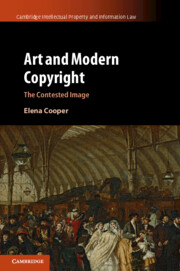Book contents
- Art and Modern Copyright
- Cambridge Intellectual Property and Information Law
- Art and Modern Copyright
- Copyright page
- Dedication
- Contents
- Acknowledgements
- Plates
- Abbreviations and Archive Sources
- Table of Cases
- Table of Statutes
- 1 Introduction
- 2 Art, Copyright and ‘Authors’, Part 1
- 3 Art, Copyright and ‘Authors’, Part 2
- 4 Art, Copyright and Collectors
- 5 Art, Copyright and the Face
- 6 Art, Copyright and the Public Interest
- 7 Drawing Conclusions
- Bibliography
- Index
- Cambridge Intellectual Property and Information Law
- Plate Section (PDF Only)
4 - Art, Copyright and Collectors
The Wrongs That Artists Commit, 1850–1911
Published online by Cambridge University Press: 02 August 2018
- Art and Modern Copyright
- Cambridge Intellectual Property and Information Law
- Art and Modern Copyright
- Copyright page
- Dedication
- Contents
- Acknowledgements
- Plates
- Abbreviations and Archive Sources
- Table of Cases
- Table of Statutes
- 1 Introduction
- 2 Art, Copyright and ‘Authors’, Part 1
- 3 Art, Copyright and ‘Authors’, Part 2
- 4 Art, Copyright and Collectors
- 5 Art, Copyright and the Face
- 6 Art, Copyright and the Public Interest
- 7 Drawing Conclusions
- Bibliography
- Index
- Cambridge Intellectual Property and Information Law
- Plate Section (PDF Only)
Summary
- Type
- Chapter
- Information
- Art and Modern CopyrightThe Contested Image, pp. 107 - 162Publisher: Cambridge University PressPrint publication year: 2018



